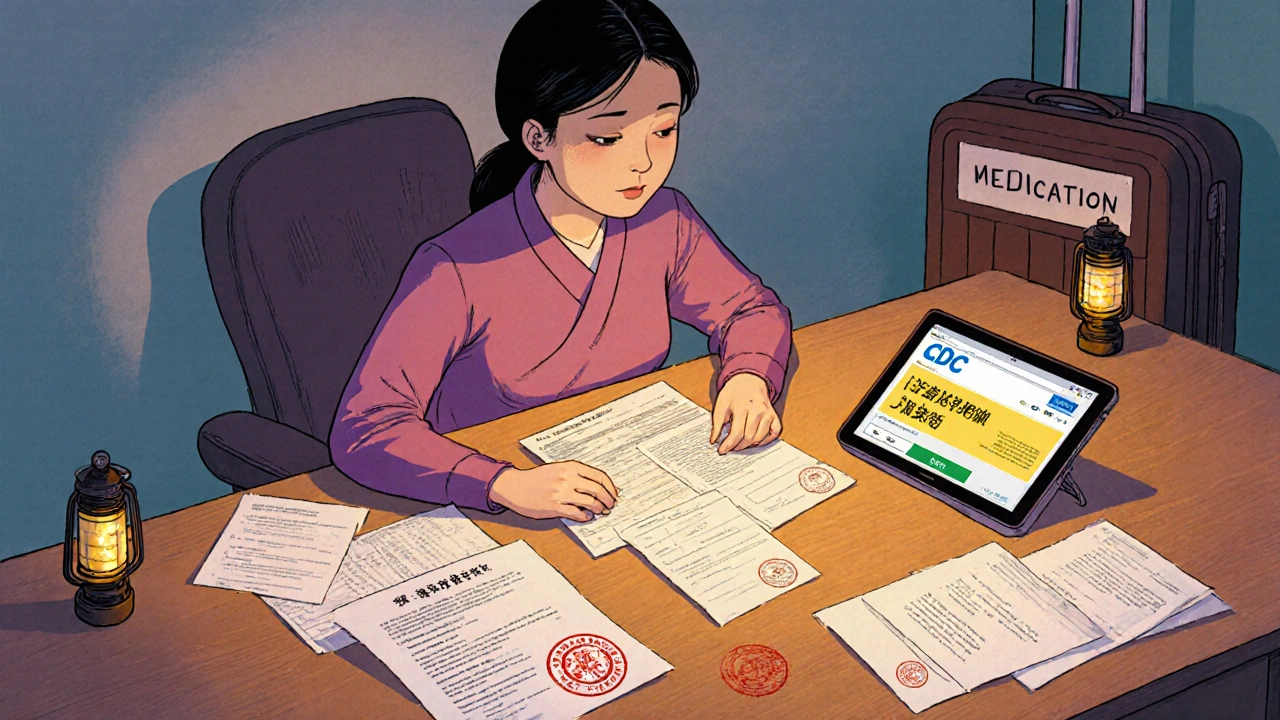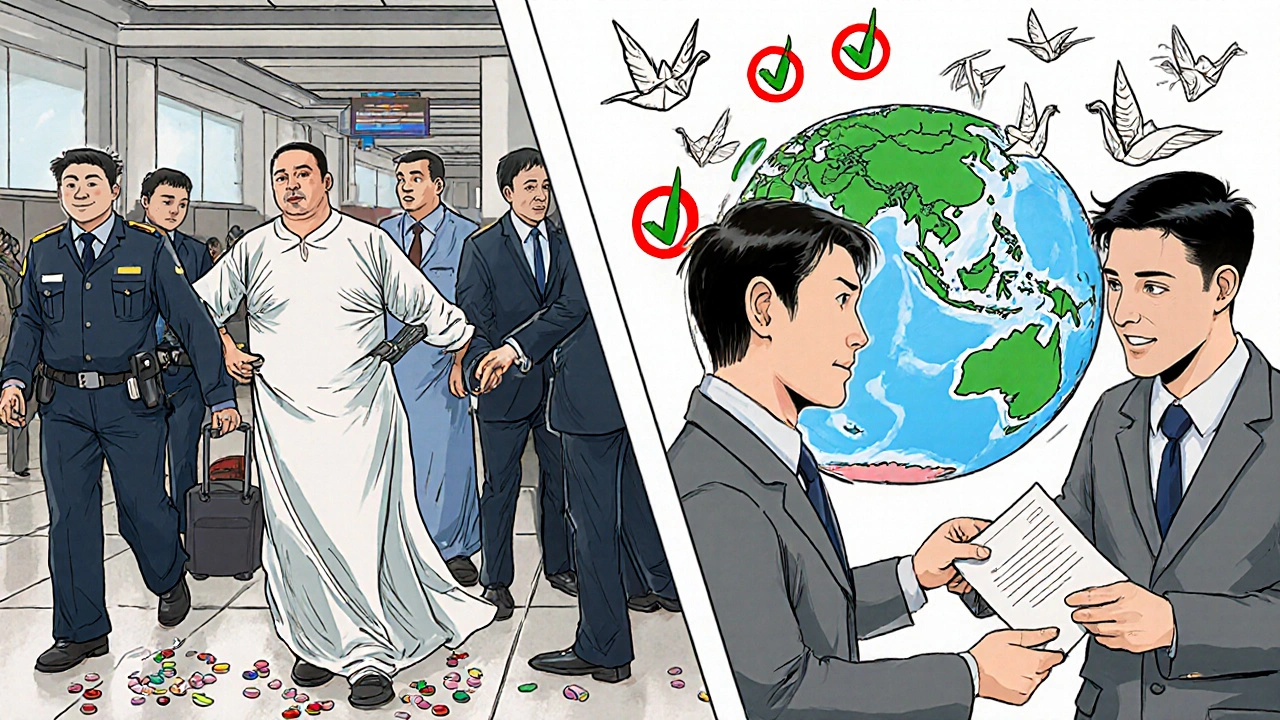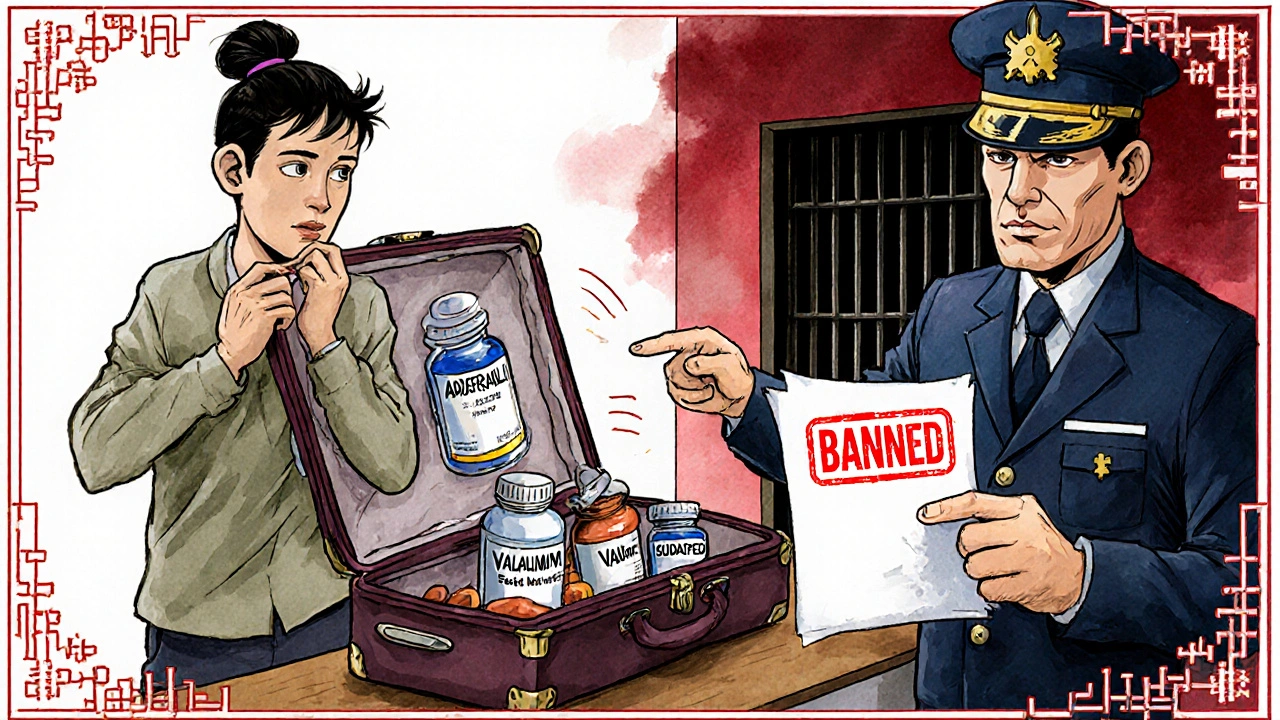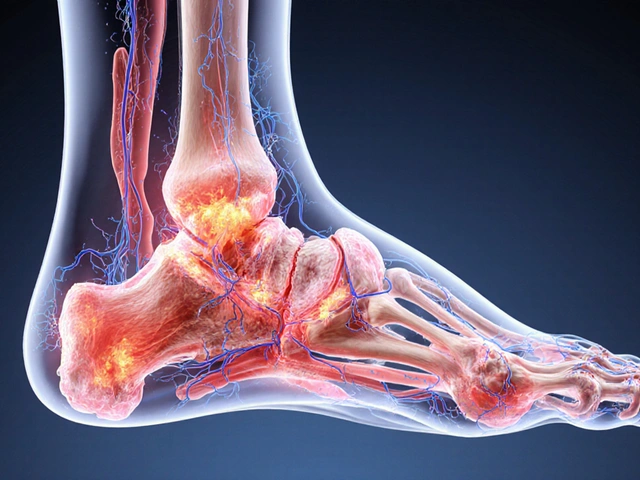Planning your next trip? Don’t just pack your clothes and passport. If you take prescription meds, you could be walking into serious trouble - even if your pills are perfectly legal at home. Countries around the world have their own drug laws, and what’s a simple painkiller or anxiety med in Australia or the U.S. might be a banned substance overseas. You won’t get a warning at the airport. No sign. No notice. One scan, one question, and your medicine is gone - or worse, you’re detained.
What You Think Is Legal Might Be a Crime
Many travelers assume if a drug is prescribed by a doctor and sold in pharmacies back home, it’s fine anywhere. That’s a dangerous myth. The truth is, over 16 countries have strict bans on common medications. Japan, for example, bans anything with pseudoephedrine - so Sudafed, Vicks inhalers, and even some cold remedies are illegal. Germany limits you to a 30-day supply of controlled substances. In the UAE, carrying Valium, Ritalin, or codeine without pre-approval can land you in jail for up to three years. Thailand imposes fines of up to $28,500 and prison time for stimulants like Adderall.The U.S. has the most extensive list of banned substances - 562 controlled drugs - but even countries with fewer restrictions can catch you off guard. China specifically targets ADHD medications like Concerta and Ritalin. In Egypt and Saudi Arabia, even common painkillers like hydrocodone are treated like heroin. And don’t assume your prescription label or doctor’s note will save you. Many countries require official documents in specific formats, translated into local languages, and approved weeks in advance.
Top Medications That Get Confiscated - And Why
Here’s what travelers are most likely to lose - or worse - at border control:- ADHD meds (Adderall, Ritalin, Concerta): Banned in 68.75% of surveyed countries, including Japan, UAE, Singapore, and Thailand. Even with a prescription, these are treated as illegal stimulants.
- Painkillers with opioids (hydrocodone, oxycodone, codeine): Prohibited in 9 out of 16 major travel destinations. These are classified as narcotics, regardless of medical need.
- Sedatives and anti-anxiety drugs (diazepam/Valium, alprazolam/Xanax, zolpidem): Banned in half of the countries studied. Carrying these for jet lag or anxiety is not accepted as a valid reason.
- Decongestants (pseudoephedrine): The most commonly confiscated item globally. Found in cold and allergy meds, they’re banned in Japan and restricted in many others because they can be used to make methamphetamine.
According to the CDC, over 1,800 cases of medication confiscation were reported in 2023 alone. Nearly 30% involved ADHD drugs. Another 24% were painkillers. Most travelers had no idea their meds were restricted until they were pulled aside at customs.
How to Check Your Medications Before You Travel
Don’t wait until you’re at the airport. Start this process 8 to 12 weeks before departure. Here’s how:- Check the official source: Visit the U.S. State Department’s travel site or the International Narcotics Control Board database. Many countries also have their own health ministry portals - like the UAE’s “Medicines for Patients” online system.
- Search by active ingredient: Don’t just look up brand names. Search for the chemical name. For example, “pseudoephedrine” instead of “Sudafed.”
- Use trusted tools: The DocHQ Travel Medicine Checker and CDC’s Yellow Book are updated annually and let you enter your meds and destination for instant results.
- Call the embassy: If you’re unsure, email or call the embassy of your destination country. Ask: “Is [medication name] permitted for personal medical use? What documentation is required?”
Pro tip: Avoid relying on travel forums or Reddit. People share stories, but they’re not legal experts. One person’s “I got away with it” doesn’t mean it’s legal - or safe.

What Documents You Actually Need
Carrying a prescription isn’t enough. Most countries require:- Original prescription - not a pharmacy label or digital copy. Must be printed on doctor’s letterhead.
- Doctor’s letter - written in English (and sometimes translated), stating your diagnosis, the medication name, dosage, and that it’s medically necessary.
- International Certificate for Psychoactive Substances - required by Japan and some European countries. Must be obtained from your national health authority within 30 days of travel.
- Country-specific forms - The UAE requires online pre-approval. Germany requires a translated copy of your prescription. Greece needs a Schengen permit.
One traveler spent 72 hours in a Dubai jail because they had 10 codeine tablets in their bag - no approval, no letter, no translation. They didn’t even know they needed one. Don’t be that person.
How Much Can You Bring?
Quantity matters. Even if your drug is allowed, carrying too much can trigger suspicion.- Japan: Maximum 3-month supply. Anything more needs special permission.
- Germany: No more than a 30-day supply without authorization.
- UAE: No official limit, but you must prove it’s for personal use. Carrying 6 months’ worth will raise red flags.
- Thailand: No clear limit, but anything beyond a 30-day supply is likely to be questioned.
Rule of thumb: Bring only what you need for the trip, plus a small buffer - maybe 5-10 extra pills. Keep them in original bottles with your name on them. Never pack them in checked luggage.
What Happens If You Get Caught?
Consequences vary wildly:- Confiscation: Most common. Your meds are taken. You’re usually let go with a warning.
- Detention: Happens in UAE, Thailand, and Japan. Can last days or weeks while officials investigate.
- Arrest and jail: Possible in the UAE, Saudi Arabia, Singapore, and Thailand for even small amounts of controlled substances.
- Deportation: Often follows detention or arrest. You’ll be banned from re-entering.
There’s no “I didn’t know” defense. Customs officers aren’t required to warn you. Ignorance is not a legal excuse.

Real Stories From the Field
A man from Melbourne flew to Tokyo with his Adderall - prescribed for ADHD. He had his prescription and a doctor’s letter. At Narita Airport, his bag was scanned. The pills were taken. He was told, “Japan does not allow amphetamines. Even if you are sick.” He spent 12 hours in a holding cell before being released. He had to fly home without his medication. Another traveler from the U.S. brought 20 tablets of codeine for back pain to Dubai. She didn’t know it was banned. She was detained for three days. Her husband had to fly in with a lawyer. She was fined and deported. On the flip side, a woman with chronic pain spent six months preparing before a trip to eight countries. She got pre-approvals from each country, translated all documents, and carried everything in original packaging. She had zero issues.What You Can Do Now
If you’re traveling soon:- Stop. Don’t pack your meds yet.
- Go to the CDC Yellow Book or State Department site. Type in your destination.
- Search each medication by its generic name.
- Call your doctor. Ask if they can provide the letter you need.
- If your med is banned, ask your doctor for an alternative that’s allowed in your destination.
It’s not about avoiding your treatment. It’s about getting your treatment without risking your freedom. This isn’t a minor inconvenience. It’s a legal risk with real consequences.
Final Thought: It’s Not Just About Pills
This isn’t just a travel tip. It’s a matter of safety, dignity, and basic rights. People with chronic pain, epilepsy, ADHD, or mental health conditions shouldn’t have to choose between their health and their freedom. But right now, that’s the reality for many travelers. The world’s drug laws are outdated, inconsistent, and often cruel. Until that changes, you need to be your own advocate.Check your meds. Get your documents. Be prepared. Your next vacation shouldn’t end in a jail cell.
Are over-the-counter cold medicines allowed overseas?
Not always. Many OTC cold and allergy meds contain pseudoephedrine, which is banned in Japan and restricted in countries like the UAE and Singapore. Even products like Sudafed, Vicks inhalers, or DayQuil can get confiscated. Always check the active ingredients - not the brand name - before packing.
Can I bring my prescription meds in my carry-on or checked luggage?
Always pack prescription medications in your carry-on. Checked bags can be lost, delayed, or opened without your knowledge. You also need immediate access to your meds in case of delays or emergencies. Keep them in original containers with your name on the label and carry your doctor’s letter with you.
What if my medication is banned in my destination country?
Talk to your doctor well before your trip. Ask for an alternative medication that’s legal in your destination. For example, if Adderall is banned, some countries allow non-stimulant ADHD meds like atomoxetine. If no alternative exists, you may need to adjust your travel plans or arrange for medical care abroad - which isn’t always easy. Never try to smuggle banned drugs.
Do I need to declare my medications at customs?
Some countries require formal declaration, especially for controlled substances. The UAE and Japan ask you to complete forms in advance. Others don’t require it, but you must still have proper documentation ready if asked. Never lie. If you’re questioned, show your documents calmly and honestly. Lying can lead to arrest.
Can travel insurance cover me if my meds are confiscated?
Most standard policies won’t cover lost or confiscated medications. But some insurers now offer optional add-ons for “medication coverage” - especially for travelers with chronic conditions. Check your policy details before you go. Even if covered, insurance won’t get your meds back or help if you’re detained.
Are there any apps or tools to check if my meds are allowed?
Yes. The CDC’s Yellow Book and DocHQ’s Travel Medicine Checker are reliable tools. You enter your destination and medication names, and they tell you if it’s allowed, what documentation you need, and any quantity limits. The U.S. State Department website also has country-specific alerts. Avoid unofficial apps or forums - they’re often outdated or inaccurate.







Scarlett Walker
November 15, 2025 AT 06:42Just got back from Japan and I swear I almost cried when they took my Sudafed. I had no idea pseudoephedrine was banned there. I thought it was just a cold medicine. Now I check every single pill before I pack. This post saved me from a nightmare next time. Thanks for sharing.
Hrudananda Rath
November 16, 2025 AT 23:21One cannot help but observe the lamentable state of global pharmaceutical governance, wherein the whims of national legislatures override the sanctity of medical necessity. It is an affront to human dignity that a man suffering from ADHD must forfeit his cognitive equilibrium due to archaic, xenophobic statutes. One wonders if the bureaucrats who draft these laws have ever been prescribed a stimulant-or if they merely fear what they do not understand.
Brian Bell
November 16, 2025 AT 23:23bro i brought my Xanax to Thailand last year and they let me through 😅 i was sweating bullets but they just asked if it was mine and i said yes and they waved me on. still scared to do it again though.
Jane Johnson
November 17, 2025 AT 01:53It's irresponsible to suggest that travelers should rely on the CDC or State Department. These institutions are not legal authorities. You should consult the actual statutes of the host nation, preferably through a licensed attorney in that jurisdiction. Otherwise, you are placing your liberty in the hands of bureaucrats who may misinterpret their own guidelines.
Peter Aultman
November 17, 2025 AT 15:07My wife has epilepsy and we traveled to Germany last year. We had her prescription, doctor's letter, and even got the translated copy. They still made us wait two hours at customs. We were lucky they didn't confiscate it. Just because it's legal doesn't mean it's easy. Always assume you'll be questioned. Bring extra copies. And never pack meds in checked luggage. Seriously.
Sean Hwang
November 18, 2025 AT 04:56if you take adderall and you're going to japan just swap it for strattera before you go. its not the same but it works. my buddy did it and he was fine. just talk to your doc early. they can help. dont risk jail over a pill.
Barry Sanders
November 19, 2025 AT 03:48People who get their meds confiscated are just lazy. If you can't be bothered to research your destination's drug laws before booking a flight, you deserve to lose your pills. This isn't a tragedy, it's basic responsibility.
Chris Ashley
November 20, 2025 AT 20:57wait so if i have a prescription for codeine and i'm going to saudi arabia i just need to bring a doctor's note? or is it still illegal no matter what? i'm confused now.
kshitij pandey
November 21, 2025 AT 23:41as someone from india where we can buy almost any pill at the corner shop, this blew my mind. i never thought a simple painkiller could land you in jail abroad. i always thought the world was more like home. now i check every medicine like it's a bomb. thanks for the wake up call. peace.